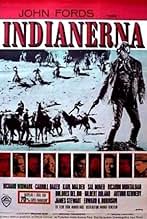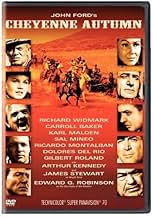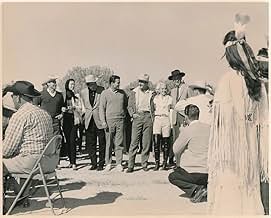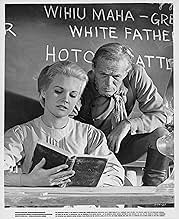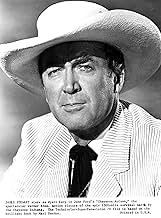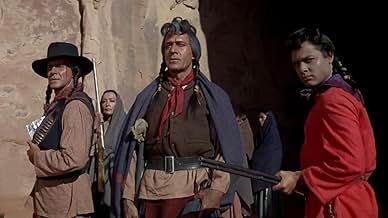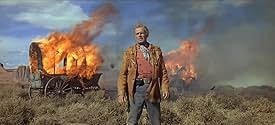IMDb RATING
6.7/10
6.8K
YOUR RATING
The Cheyenne, tired of broken U.S. government promises, head for their ancestral lands but a sympathetic cavalry officer is tasked to bring them back to their reservation.The Cheyenne, tired of broken U.S. government promises, head for their ancestral lands but a sympathetic cavalry officer is tasked to bring them back to their reservation.The Cheyenne, tired of broken U.S. government promises, head for their ancestral lands but a sympathetic cavalry officer is tasked to bring them back to their reservation.
- Director
- Writers
- Stars
- Nominated for 1 Oscar
- 1 win & 3 nominations total
Dolores Del Río
- Spanish Woman
- (as Dolores Del Rio)
Elizabeth Allen
- Guinevere Plantagenet
- (as Betty Ellen)
- Director
- Writers
- All cast & crew
- Production, box office & more at IMDbPro
Featured reviews
When I saw this during its first release, I was, like most other viewers, thoroughly awed by William Clothier's magnificent handling of the 70mm cameras (although some scenes, unfortunately, had to be completed with quite evident manipulation of actors performing on a soundstage in front of previously photographed exterior shots, and some sets were much-too-obviously studio bound.) The casting of non-Native Americans didn't surprise me then, though I might now reluctantly join the ranks of those who would prefer otherwise. However, then we would miss Victor Jory, Sal Mineo, Gilbert Roland, Ricardo Montalban and the beautiful Dolores del Rio playing their roles with the requisite dignity and professional aplomb. Carroll Baker gives poignancy to her portrayal of a young Quaker woman, true to her convictions, and Richard Widmark and Edward G. Robinson enact Americans with a conscience, none too happy with the assignments required by their government. Karl Malden, as the brutal Capt. Wessels, doesn't beg for our forgiveness, to say the least. But I will agree with those who find the James Stewart sequence a jarring contrast to the presumed thrust of the narrative.
My own take on that is the otherwise surprising absence of John Ford's customary over-reliance on sentimentality in this particular enterprise. At the very least when he made a movie with a setting in the Old West, he usually insisted upon using folk songs, sometimes ad nauseum, as background (and foreground) musical accompaniment, but here the very sophisticated Alex North is credited with the musical score, and its bitter strains are not at all typical of a John Ford production. I do not know if Mr. North was assigned to this project against Mr. Ford's preference, but that noted composer's contribution (He was nominated fourteen times for an Academy Award, though not for this one.) is one of his best and most appropriate accomplishments, to my ears. Except for his uncredited work on "Young Cassidy" and the truly atypical "Seven Women" starring Anne Bancroft which followed this major screen opus, John Ford made a final bow here that may not be his best but which unquestionably bears the mark of a master of the cinema.
My own take on that is the otherwise surprising absence of John Ford's customary over-reliance on sentimentality in this particular enterprise. At the very least when he made a movie with a setting in the Old West, he usually insisted upon using folk songs, sometimes ad nauseum, as background (and foreground) musical accompaniment, but here the very sophisticated Alex North is credited with the musical score, and its bitter strains are not at all typical of a John Ford production. I do not know if Mr. North was assigned to this project against Mr. Ford's preference, but that noted composer's contribution (He was nominated fourteen times for an Academy Award, though not for this one.) is one of his best and most appropriate accomplishments, to my ears. Except for his uncredited work on "Young Cassidy" and the truly atypical "Seven Women" starring Anne Bancroft which followed this major screen opus, John Ford made a final bow here that may not be his best but which unquestionably bears the mark of a master of the cinema.
I have recently seen again "Cheyenne Autumn", and, perhaps, I finally got it. In my opinion, this film represents the desperation of an artist, the director John Ford. Forget the usual stunning beauty of the cinematography, the accuracy in filming action scenes, the care for poetic details, and all Ford's trade-mark style. We readily see that "Cheyenne Autumn" is completely different from any other western movie, and not only from the remainder of Ford's work.
Compared with other western movies, the main difference and innovation is that here any killed man is a REAL tragedy, that exhaustion, famine, cold, violence are REAL sufferings for the miserable people on the screen (not just for the Cheyennes, even for the whites). And all that is shown us by Ford ruthlessly, uncompromisingly. The fact that the director stands for the Indians is not as much innovative as it seems. All along his career Ford showed respect and sympathy for them. In the finale, just after an apparent happy ending, we have again violence, again a murder, again a distressed mother: we almost feel the same grief of hers. It is somewhat ironic that in the same year the film was made, 1964, the fashion of Italian western movies invaded the world of cinema, with furious, acrobatic gun-fights and hundreds of shot-dead people, like in a sort of funny game.
The movie is split into two parts by a comic interlude, the episode placed in Dodge City, which is actually a farce. I think that Ford wanted to pay a homage and bid his personal farewell to the old silent western-movies of the 1920s, when his career started. The funny situations are deliberately over the top: see the sensational, licentious joke, when Wyatt Earp (Jimmy Stewart) realizes that he actually had met the girl in Wichita... In any case, a somewhat gloomy mood permeates even this comic part. The main characters are all aged, grey-haired and seemingly life-weary. And the episode is introduced by a particularly brutal, cruel murder.
I think that "Cheyenne Autumn" is a beautiful film, with a good story, great visual beauties, and, in particular, an excellent acting by the whole cast. But it is tough for me to face John Ford's desperate vision. After all, what I most like in the movie is to see, once again, Ben Johnson and Harry Carey Jr on horse-back, in their blue uniforms (by the way: why are they uncredited?). They are both aged and bulkier compared with their look in the great Ford's western-epics of their youth. Never mind: they are almost dearer to me for this very reason...
Compared with other western movies, the main difference and innovation is that here any killed man is a REAL tragedy, that exhaustion, famine, cold, violence are REAL sufferings for the miserable people on the screen (not just for the Cheyennes, even for the whites). And all that is shown us by Ford ruthlessly, uncompromisingly. The fact that the director stands for the Indians is not as much innovative as it seems. All along his career Ford showed respect and sympathy for them. In the finale, just after an apparent happy ending, we have again violence, again a murder, again a distressed mother: we almost feel the same grief of hers. It is somewhat ironic that in the same year the film was made, 1964, the fashion of Italian western movies invaded the world of cinema, with furious, acrobatic gun-fights and hundreds of shot-dead people, like in a sort of funny game.
The movie is split into two parts by a comic interlude, the episode placed in Dodge City, which is actually a farce. I think that Ford wanted to pay a homage and bid his personal farewell to the old silent western-movies of the 1920s, when his career started. The funny situations are deliberately over the top: see the sensational, licentious joke, when Wyatt Earp (Jimmy Stewart) realizes that he actually had met the girl in Wichita... In any case, a somewhat gloomy mood permeates even this comic part. The main characters are all aged, grey-haired and seemingly life-weary. And the episode is introduced by a particularly brutal, cruel murder.
I think that "Cheyenne Autumn" is a beautiful film, with a good story, great visual beauties, and, in particular, an excellent acting by the whole cast. But it is tough for me to face John Ford's desperate vision. After all, what I most like in the movie is to see, once again, Ben Johnson and Harry Carey Jr on horse-back, in their blue uniforms (by the way: why are they uncredited?). They are both aged and bulkier compared with their look in the great Ford's western-epics of their youth. Never mind: they are almost dearer to me for this very reason...
This was John Ford's last Western and it is generally viewed as a weak film. It has been described as his "apology" to Indians for his allegedly negative portrayal of them in his earlier films. If you read the statement he made to Peter Bogdonavich, he doesn't actually use the word "apology". He says he just wanted to a make movie told more from the Indian point of view.
This makes more sense, because most Ford Westerns, with perhaps the exception of "Stagecoach" and "Rio Grande" dealt relatively fairly with Indian characters. I don't think he had much to apologize for.
This movie is underrated by critics. I'm not sure why. I thought it compared favorably with his better work.
Here are the positives about the movie:
Now here are some things that kept the movie from being better:
On the one hand, it seems very odd to introduce a German officer who's oppressing the Cheyenne because "he's only following orders." Do we have to implicate the Germans in our genocide? Don't they have enough problems of their own on this issue?
On the other hand, I guess the point was to draw a comparison between the Holocaust and the destruction of the American Indian population. This was probably a very aggressive and controversial idea in 1964, for Americans anyway. The Germans I've known over the years never had a problem mentioning it to me. In fact, often they would talk of little else.
This makes more sense, because most Ford Westerns, with perhaps the exception of "Stagecoach" and "Rio Grande" dealt relatively fairly with Indian characters. I don't think he had much to apologize for.
This movie is underrated by critics. I'm not sure why. I thought it compared favorably with his better work.
Here are the positives about the movie:
- It may be Ford's most beautiful film. He lingers in Monument Valley far longer than the logic of the script would dictate. He knew this would be that last time he would shoot there. The results are spectacular.
- The film has a stately, almost regal pace with an excellent accompanying soundtrack. This matches the pace of the central plot element – a six month journey by foot.
- It manages to never be dull. This is quite an accomplishment since there is no real hero, no real heavy and very little violent conflict. It's an example of very fine low key storytelling.
- Although this is a strong Indian point of view movie, it never becomes condescending or maudlin. Both sides are presented with respect and complexity.
- I've read much criticism of the Dodge City comic relief interlude. I thought this was fantastic segment. What a pleasure to see old pros like John Carradine, James Stewart and Arthur Kennedy do cameos in Ford's last Western. Ford understood the importance of inserting comic relief into Westerns, which are normally tense dramas in need of counterpoint. This is even more effective in the fundamentally somber "Cheyenne Autumn".
- Almost all strong Indian point of view movies are relentless downers that include no comic relief. For example, "Devil's Doorway", "Broken Arrow", "Dances With Wolves". Ford doesn't compromise on his traditional heavy use of humor in this movie and he also includes a somewhat optimistic ending. The ending may seem unrealistically positive, but it is actually at least partly rooted in historical accuracy, from what I've read. Of course, in the big historical picture there was no happy ending for the Indians. The question is: who wants to watch a movie that is that depressing? Ford strikes a good compromise here.
- Carol Baker is an underrated actress. She has a great screen presence and is very good in this film. Her character was very credible, if maybe a little too good looking. If she's a typical 1880's Quaker chick, I would have had to rethink my religious affiliation.
Now here are some things that kept the movie from being better:
- Widmark looks great, but I wish his character had been a more active player in plot developments. It's not best for the male lead to be too much of an observer. Also, he is way too old to be Carol Baker's romantic interest.
- The Indians are poorly cast with the use of mediocre Hispanic actors. I can't believe those weird bangs are authentic hairdos either. If they are, I would have invoked artistic license to change them.
- The subplot with the split between the Cheyenne leaders and the final confrontation at the end was poorly drawn, poorly acted and pointless.
- There are a few plot holes. The only one that really bothered me was the Cheyenne somehow managing to smuggle 20 rifles into their holding facility in the fort in Nebraska.
- Finally, this isn't really a fault, but I wanted to mention that I'm torn about Karl Malden's character.
On the one hand, it seems very odd to introduce a German officer who's oppressing the Cheyenne because "he's only following orders." Do we have to implicate the Germans in our genocide? Don't they have enough problems of their own on this issue?
On the other hand, I guess the point was to draw a comparison between the Holocaust and the destruction of the American Indian population. This was probably a very aggressive and controversial idea in 1964, for Americans anyway. The Germans I've known over the years never had a problem mentioning it to me. In fact, often they would talk of little else.
This film shows just a bit of the tragedy of Northern Cheyenne. The film or John Ford did not show that they initially fought together with Sioux led by Sitting Bull war in 1876 and were partially massacred by Custer. Later they fought once again and were defeated at McKenzie compelling them to surrender. Two years later, the prisoners Dull Knife, Wild Hog, and Little Wolf were brought down as prisoners to Fort Reno, from where they escaped and were later killed without mercy. Part of the survivors were killed later when they tried to escape from Fort Robinson, Nebraska, and the others finally confined to a reservation in Montana. Probably Ford wanted to show this story softly giving some feeling of justice to Captain Archer (Richard Widmark), but at the end the film became an approximate story of the reality. Cheyenne, either northern or southern were expelled out from their natural areas, they missed bull hunting and their ancestral traditions. Beside this historical considerations, one must admit that Ford had a very good cast for the film with Widmark, Carroll Baker, always efficient Edward G. Robinson, Karl Malden and others. The only thing difficult to understand was the scene with James Stewart (as Wyatt Earp) together with the veterans Arthur Kennedy and John Carradine, which in my opinion was out of the context.
Some people believe that Westerns are not more of use in Hollywood. I believe that some westerns giving real stories of what happened with the Indians are very much necessary to understand the history of the real American people. Geronimo, Sitting Bull, Dull Knife and others were not criminals, they were only defending the land where they were born and raised. So their lives should be brought fairly to the screen in the coming future.
Some people believe that Westerns are not more of use in Hollywood. I believe that some westerns giving real stories of what happened with the Indians are very much necessary to understand the history of the real American people. Geronimo, Sitting Bull, Dull Knife and others were not criminals, they were only defending the land where they were born and raised. So their lives should be brought fairly to the screen in the coming future.
Unfortunately, given the subject matter and the director, "Cheyenne Autumn" fails to achieve the greatness of its aspirations. Injustice to Native Americans has along tragic history, and the topic deserved a soaring film that brought those crimes to a broad audience. After years of depicting Native Americans as the villains, John Ford was certainly the right director to cast a sympathetic eye on their plight, and the film has many grand sequences that are reminiscent of Ford's finest westerns. The brilliant camera work of William Clothier captures the majesty of Monument Valley and often bathes the mountains and characters in the warm glow of sunsets.
For some reason, Ford felt that Latino actors were appropriate for the roles of Native Americans, and Ricardo Montalban, Gilbert Roland, and Dolores del Rio do achieve a measure of dignity as members of the long-suffering Cheyenne tribe. While Carroll Baker tries hard as a Quaker woman who accompanies the Cheyenne on an arduous trek back to their homeland, her bleached blonde hair, immaculate make-up, and voice undercut her efforts. The work of composer, Alex North, also sounds out of place. Best known for his scores for "Spartacus" and "Cleopatra," North's music here evokes Roman legions rather than the U.S. cavalry.
However, the biggest flaw in the film is a misconceived episode in the middle that features James Stewart, Arthur Kennedy, and John Carradine. As Wyatt Earp and Doc Holliday, Stewart and Kennedy perform a comedy routine that jars with the solemnity of the previous scenes. Indeed, the entire Dodge City sequence is a western comedy, and viewers would be justified in thinking that some film reels were mislabeled and an entire sequence from another film had been inserted accidentally. Whatever dignity and concern was established in the film's first hour are destroyed when the action moves from the Cheyenne to Earp and Dodge City.
"Cheyenne Autumn" was likely conceived as a follow-up to the successful "How the West Was Won." John Ford was one of the directors of that Cinerama film; Carroll Baker, Karl Malden, James Stewart, and Richard Widmark are featured in both films; and the ads for the two westerns are strikingly similar. Widmark anchors "Cheyenne Autumn" and provides a narration much as Spencer Tracey did for "How the West Was Won." However, the earlier movie was a rousing adventure with a great score and an uplifting theme of westward expansion. Despite an overture and intermission, "Cheyenne Autumn" is a small, sober tale of racial injustice that has been stretched out and embellished with a jarring music score and a schizophrenic mix of comedy and tragedy that lays waste to some fine epic moments.
For some reason, Ford felt that Latino actors were appropriate for the roles of Native Americans, and Ricardo Montalban, Gilbert Roland, and Dolores del Rio do achieve a measure of dignity as members of the long-suffering Cheyenne tribe. While Carroll Baker tries hard as a Quaker woman who accompanies the Cheyenne on an arduous trek back to their homeland, her bleached blonde hair, immaculate make-up, and voice undercut her efforts. The work of composer, Alex North, also sounds out of place. Best known for his scores for "Spartacus" and "Cleopatra," North's music here evokes Roman legions rather than the U.S. cavalry.
However, the biggest flaw in the film is a misconceived episode in the middle that features James Stewart, Arthur Kennedy, and John Carradine. As Wyatt Earp and Doc Holliday, Stewart and Kennedy perform a comedy routine that jars with the solemnity of the previous scenes. Indeed, the entire Dodge City sequence is a western comedy, and viewers would be justified in thinking that some film reels were mislabeled and an entire sequence from another film had been inserted accidentally. Whatever dignity and concern was established in the film's first hour are destroyed when the action moves from the Cheyenne to Earp and Dodge City.
"Cheyenne Autumn" was likely conceived as a follow-up to the successful "How the West Was Won." John Ford was one of the directors of that Cinerama film; Carroll Baker, Karl Malden, James Stewart, and Richard Widmark are featured in both films; and the ads for the two westerns are strikingly similar. Widmark anchors "Cheyenne Autumn" and provides a narration much as Spencer Tracey did for "How the West Was Won." However, the earlier movie was a rousing adventure with a great score and an uplifting theme of westward expansion. Despite an overture and intermission, "Cheyenne Autumn" is a small, sober tale of racial injustice that has been stretched out and embellished with a jarring music score and a schizophrenic mix of comedy and tragedy that lays waste to some fine epic moments.
Did you know
- GoofsThe language used by the Cheyenne in this movie is not Cheyenne. It is Navajo. Cheyenne is an Algonquian language, whereas Navajo is Athabaskan (Na Dene), and they do not sound even remotely similar. This is explainable, however, by the fact that this film was shot on the Navajo Nation.
- Quotes
Secretary of the Interior: Oh, Henry... you and I fought together at Gettysburg. You had never seen a Negro slave. All you ever knew was that they were human beings with the rights of human beings - and it was worth an arm to you.
- Alternate versionsMany television prints run 145 minutes, and omit the scene with James Stewart as Wyatt Earp. The video release is the full 154-minute version.
- ConnectionsEdited into Film socialisme (2010)
- How long is Cheyenne Autumn?Powered by Alexa
Details
- Release date
- Country of origin
- Language
- Also known as
- El ocaso de los cheyenes
- Filming locations
- Production company
- See more company credits at IMDbPro
Box office
- Budget
- $4,200,000 (estimated)
- Gross worldwide
- $10,980
- Runtime2 hours 34 minutes
- Aspect ratio
- 2.20 : 1
Contribute to this page
Suggest an edit or add missing content




